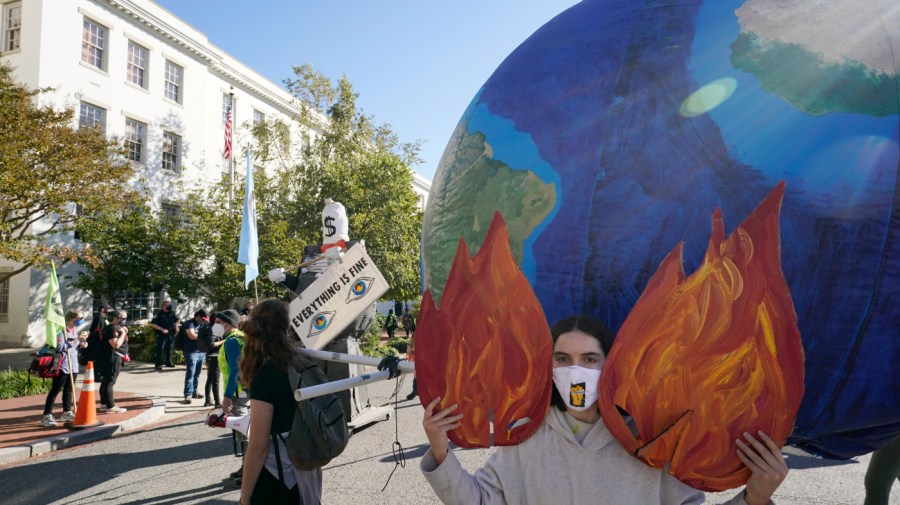
Last year’s presidential election was a demolition derby for a host of progressive causes and illusions. Democrats are the biggest casualties of this collision with political reality, but Green New Dealers aren’t far behind.
President Trump’s triumphant return to the White House puts climate science deniers back in charge of national policy, at best retarding and at worst reversing America’s clean energy transition for the next four years.
After declaring a bogus “national energy emergency” last week (is he really unaware that U.S. oil and gas production has surged in recent years?) Trump issued executive orders pulling America out of the Paris climate accord, expanding drilling on public lands, blocking offshore wind and gutting former President Joe Biden’s clean energy initiatives.
Climate change was far from the voters’ top issue last November. In fact, the outcome underscored the failure of environmental activists to convince voters that it should be. Nor have they come close to forging a national consensus behind their demands to swiftly phase out fossil fuels and rely exclusively on renewables.
It turns out that waging a quasi-religious war against oil and gas isn’t an effective way to rally majority support for fighting climate change. Most Americans favor the latter, but not the former, which they see as both impractical and gratingly sanctimonious.
When people roll up to the gas station to fill their tank, they don’t want to feel like sinners because they need fuel to get to work, run errands, pick up kids and see friends. Nor do most join the green left in villainizing U.S. energy companies that employ millions of Americans to find, extract and deliver oil and gas to them.
It’s environmentalists’ turn to face an inconvenient truth: For over a century, fossil fuels have powered a surge of economic growth that has dramatically lifted living standards all over the world. They’re deeply embedded in a global energy infrastructure that can’t be uprooted overnight. It will take time and money to build a whole new energy system around a variety of low-to-non-carbon emitting sources.
That’s why trying to scare Americans into backing bans on oil and gas exploration, fracking and pipeline construction hasn’t worked. And there’s a growing backlash here and across Europe against grandiose “net zero” goals for carbon emissions that voters increasingly link to higher energy prices and pinched supplies.
The greens’ climate catastrophism has struck out, especially with non-college voters, who far outnumber those with degrees. To them, it sounds like an elite obsession far removed from their everyday financial struggles. In a recent YouGov poll, they ranked climate change 16th out of 18 issues in importance.
Working Americans, in fact, strongly favor (72 percent) increasing oil and gas production. Ironically, both grew briskly on President Biden’s watch, even as he kept warning us that climate change poses an “existential crisis” for humanity.
In 2023, the United States produced more crude oil than any country in history, surpassing even Saudi Arabia. Over the last four years, America also became the world’s leading natural gas producer and exporter.
But voters didn’t know that, because neither Biden nor Kamala Harris dared to take credit for presiding over the oil and gas boom. That would have scandalized the potent green alliance of millennial activists, well-funded environmental lobbies, wealthy donors, and left-leaning foundations that dominate their party’s thinking about energy.
Like their MAGA antagonists, progressive climate warriors exist in a political bubble where everyone thinks alike and scorns non-believers. Instead, they should put aside doom-crying, which makes the climate challenge sound insoluble, and try to assuage working Americans’ reasonable qualms about high fuel bills and shortages.
Fortunately, less than a third of non-college voters share Trump’s yen for a one-dimensional energy policy. Most express a strong preference for an “all-of-the-above” approach that doesn’t force them to choose between fossil fuels, nuclear energy, renewables and cleaner fuels still on the drawing board.
Rather than stoking public fears of impending planetary doom, green activists should embrace a pragmatic strategy of full-spectrum energy innovation to enable America to lead the way in decarbonizing the atmosphere.
For starters, Congress should pass hard deadlines on environmental reviews and permitting. Also urgent is modernizing our outdated electricity grid, with natural gas assuring reliability while renewables and better energy storage come online.
Despite the greens’ aversion to nuclear power, it’s hard to see how our country and others can meet growing energy demand — including for powering AI — without next-generation nuclear reactions.
The federal government also should ramp up investments in hydrogen, battery, carbon sequestration, fusion, and geothermal technologies. All this will require steady investment, which logically should be financed by taxing carbon. And rather than spout hackneyed rhetoric about price gouging, our political leaders should forge public-private partnerships to tap the talents and ingenuity of U.S. energy companies.
It would also help if environmentalists acknowledged that fossil fuels support U.S. national security as well as our economy. A good example is America’s growing ability to supply Europe with natural gas, which has blunted Russia’s ability to weaponize its vast oil and gas reserves to silence critics of its war on Ukraine.
Finally, backing a mix of fuels and technologies can help Democrats turn the tables on Trump, who absurdly persists in calling climate change a hoax. He says his goal is U.S. “energy dominance.” But his unreasoning hatred of renewables — especially wind energy — will kneecap America in the race with China for global leadership on clean energy.
Democrats can’t protect the climate if they can’t get elected. Embracing energy realism now will help them win a new hearing among working Americans.
Will Marshall is founder and president of the Progressive Policy Institute.












